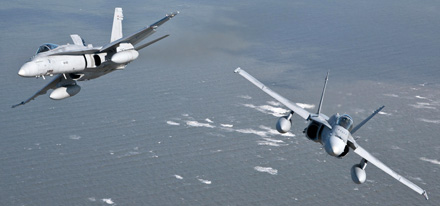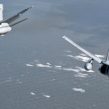
Tentative Steps Toward Deepening Defense Cooperation in the Baltic Region
Publication: Eurasia Daily Monitor Volume: 10 Issue: 15
By:

In late December, the Swedish defense chief, General Sverker Göranson, stoked controversy by noting that Sweden would only be able to defend itself for a week without outside help (Svenska Dagbladet, December 30, 2012). Generally taking its cues from Sweden, a few weeks later, a similar estimate of Finnish defense capability emerged when Alpo Juntunen, a retired academic, cited an increase in Russia’s military capability and opined Finland could only hope to briefly defend parts of its southern territory (Ilta-Sanomat, January 7).
Both estimates were met with swift government dismissals. Swedish Defense Minister Karen Enström noted Sweden’s military capabilities were sufficient in light of potential threats and comparable to its neighbors (Dagens Nyheter, January 9). In Finland, Juntunen’s remarks were met with emphatic rejection. Finnish Defense Minister Carl Haglund stressed that Finland was able to defend itself and, in contrast to Sweden, Finland retains a comparatively high defense capability (Helsingin Sanomat, January 8).
Nonetheless, Göranson’s and Juntunen’s comments struck a nerve in their respective countries, as well as the broader Baltic region, as both face economic pressures and a shifting strategic environment in their neighborhood. Indeed, the remarks have triggered unusually spirited debates in both countries, highlighting the growing willingness to deepen defense cooperation between the Nordic countries and their Baltic neighbors.
The idea of Nordic defense cooperation has existed for decades, but it has gained momentum only in the past few years. Since 2009, when NORDEFCO—an organization for Nordic defense cooperation—was established, defense cooperation between member states has increased steadily, including military exercises and pooling and sharing military hardware. While the framework involves North Atlantic Treaty Organization (NATO) members Norway, Denmark and Iceland, militarily non-aligned Finland and Sweden have been most keen to engage in further cooperation due to significant budget cuts, which have motivated Helsinki and Stockholm to find defense savings through cooperation. Ironically Sweden’s recent defense cuts and the concomitant switch to a professional military have increased the potential for military cooperation with Finland, which still remains deeply committed to maintaining universal conscription and territorial defense.
For Finland and Sweden, the interest in Nordic defense cooperation is heavily affected by changes in the balance of power in the Baltic region—the quickening pace of Russia’s military modernization, its increasingly assertive posture toward former Soviet satellite states in eastern Europe, and the United States’ phased restructuring of its military resources in Europe—as well as budgetary constraints facing Swedish and Finnish militaries. Specifically, Russia is strengthening its Baltic naval fleet with the purchase of several modern Mistral-class ships from France, designed for airborne and amphibious landings (see EDM, June 27, 2011; Finnish National Defence University Report 47, 2011). These ships, the first of which is to be delivered in 2014, would give Russia the capability to project power on the weakly defended coastlines of the Baltic States—Lithuania, Latvia and Estonia—thus making their strategic isolation even more poignant. Although Scandinavian relations with Russia are generally good, Russia’s improved rapid power projection capabilities on the Baltic are a source of concern at a time when Sweden and Finland have to maintain their defensive capabilities with diminishing resources. This alarm is acutely reflected in the comments of Göranson and Juntunen.
These geopolitical developments have raised questions as to how to fill the resulting gap in military capabilities among both Nordic and Baltic states. Having opted not to join NATO, and being hemmed in by domestic constraints, Finland and Sweden have been most acutely affected by the failure of the European Union—of which both are full members—to formulate a meaningful defense component. US presence and interest in the Baltic region has previously left this issue moot, but as Washington reconsiders its military commitments in light of its foreign policy priorities in Asia, these developments prompt a response from the Nordic countries in terms of deepening regional cooperation on security issues.
A key component is the Nordic-Baltic Eight (NB8), a regional format including the five Nordic countries and Estonia, Latvia and Lithuania. While the NB8 covers myriad issues, as noted in the 2012 NB8 Cooperation Report, increased defense and civil security cooperation has been highlighted. Also beyond the NB8, the degree of defense cooperation between the non-NATO Nordics and NATO is high; Urmas Paet, the Estonian Foreign Minister, described Finland and Sweden as “de facto NATO members” (Helsingin Sanomat, January 15). However, as a defense framework, the NB8 has been built around the reluctance of Finland and Sweden to outright join the North Atlantic Alliance.
Popular support for NATO membership in the two countries has remained invariably low, and even close association with NATO has led to unexpected backlashes. The Finnish government was forced last year to delay its decision on whether to participate in Icelandic air policing due to vocal opposition calling attention to its NATO framework (Suomenmaa, November 2, 2012). It is telling that the Finnish government has sought to cast the operation as a part of Nordic defense cooperation (MTV3, October 31, 2012). Decision-makers in Finland and Sweden are stuck with regard to NATO membership as both countries are waiting for the other to take the first step; and so, given the consistent opposition to NATO membership, NORDEFCO or NB8 are enticing alternatives for Helsinki and Stockholm.
This limitation is recognized by both the United States and Russia, both of whom view further Nordic defense integration as either positive or mostly harmless. For the United States, fostering regional cooperation is a pragmatic way to foster stability in the Baltic region and reassure its strategically vulnerable Baltic allies. For Russia, Nordic defense cooperation is preferable to the alternative of having Finland or Sweden join the North Atlantic Alliance, which Moscow considers its chief geopolitical rival (see EDM, February 22, 2010). However, for the Baltic states themselves, full Nordic NATO membership would be by far the preferred option as it would deepen Nordic commitment to the defense of the Baltic states and support operational planning. Estonia in particular has energetically advocated for Finnish and Swedish NATO membership (YLE, January 13) and lobbied for more active Nordic participation in the Alliance’s Baltic air policing.
Although far-reaching shifts are presently unlikely, the tone of the Nordic defense debate is changing in favor of a more positive attitude to deeper integration. However, the real question perhaps is whether the Nordics have any significant intention of extending the “solidarity in the face of current and future challenges,” as called for by Swedish Foreign Minister Carl Bildt and Defense Minister Enström (Dagens Nyheter, January 13), to their Baltic neighbors.




